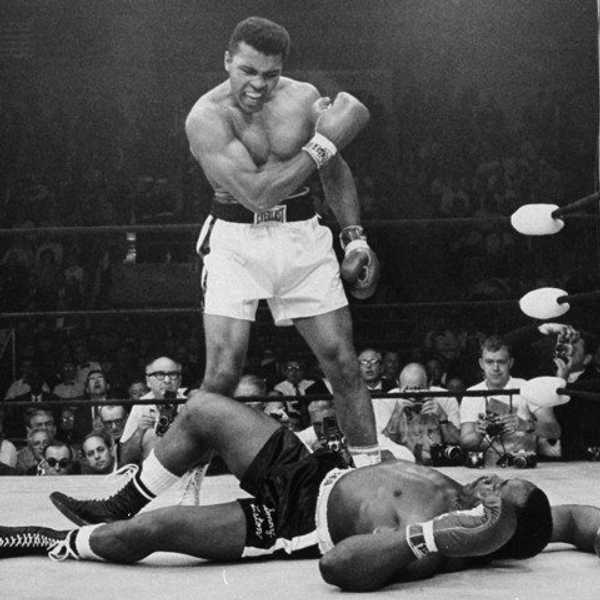Here’s a word of unsolicited advice: you should question anyone who tells you Muhammad Ali transcended race—even if that anyone happens to be his daughter.
If they mean Ali was beloved by all, regardless of race, then I suppose he does now and did in his old age. When he was in his prime, he would have been insulted by the insinuation. In the 1960s and 1970s, to suggest that an athlete “transcended” race most likely meant that athlete was silent on it—and Muhammad Ali was not silent. He was not silent on race in speaking of his conscientious objection to being drafted for the Vietnam War, saying, “I got nothing against the Viet Cong. No Vietnamese ever called me a nigger,” and, “No, I’m not going 10,000 miles from home to help murder and burn another poor nation simply to continue the domination of white slave masters of darker people the world over.” Nor was he silent on Islam when he explained why he changed his name: “Cassius Clay is a slave name. I didn’t choose it, and I didn’t want it. I am Muhammad Ali, a free name—it means ‘beloved of God’—and I insist people use it when speaking to me and of me.”
Nor was Muhammad Ali beloved by all people. On Facebook posts by media outlets about Ali’s death on Friday, you can still find people calling him a draft dodger, some of whom accuse him of converting to Islam so he could avoid being drafted. Ali’s adherence to the Nation of Islam did not ingratiate him with America either; nor did it curry him favor with black Americans. It caused him to run counter to mainstream civil rights movements, such as those of largely Christian organizations led by Dr. Martin Luther King, Jr., in his belief in the necessity of separate racial societies (his beliefs softened when he converted to Sunni Islam in 1975).
In Ali’s time, there were some who criticized him for his “arrogance”—as if one ought to expect a professional athlete, let alone a three-time boxing heavyweight champion (two-time at the time of this exchange), to be humble. Professional athletes believe they are among the best, if not the best, in the world at what they do, both as a matter of fact and of motivation. Recall that after Game 5 of last year’s NBA Finals, which the Cavaliers lost, putting Warriors at the brink of winning the championship, LeBron James, asked why he was still confident, said, “[…] I feel confident because I’m the best player in the world; it’s simple.” Should we have expected LeBron, or Ali in his time, to defer to others—especially when we sometimes use the same motivational tactics ourselves? I’m not so arrogant as to believe I’m the smartest student at Harvard—especially because I’ve proven nothing of the sort, inasmuch as such things are verifiable—but I’ll be damned if I believe I’m inferior to any of my peers. We use these motivational tools all the time, but when public figures use them, we deride them as arrogant, as classless.
In writing this, I don’t intend to suggest Muhammad Ali is a saint. I don’t intend to defend him for calling Ernie Terrell an “Uncle Tom” or for slapping him on live television for refusing to call by his Muslim name; or for calling Floyd Patterson an “Uncle Tom”; or for calling Joe Frazier an “Uncle Tom” (seeing a pattern?), a “dumb ugly gorilla,” and other insults. Ali would eventually say the name-calling was hype, and he never intended to hurt anyone; but that didn’t mitigate the damage his words did to his opponents personally and professionally. No, Muhammad Ali was not a saint; he was not everything to everyone; he was not universally admired.
And that’s exactly how we need to remember him.
Muhammad Ali was a complex man. He was unapologetically black and Muslim; he was brash and confident to the point of being seen as arrogant by some. He was so iconoclastic, and a man of such deep convictions, that he publicly refused to be drafted into the Army and lost his boxing license and heavyweight championship, was willing to go to jail rather than be drafted; and fought the government all the way to the Supreme Court. (Who actually thinks the Army would have put Muhammad Ali, the heavyweight champion of the world, on the front lines?) While it is popular now to say the Vietnam War was a mistake, Ali’s views did not endear him to many Americans.
Yes, today, Muhammad Ali is beloved and mourned by many people across racial and religious lines. But he did not try to “transcend” race or religion. How could he, when he changed his name from Cassius Clay to Muhammad Ali because “Cassius Clay” was a slave name? Saying Muhammad Ali “transcended” race and religion erases arguably the most important part of his legacy—more important than his prowess as a boxer—and it's an overly simplistic way to commemorate him.





















